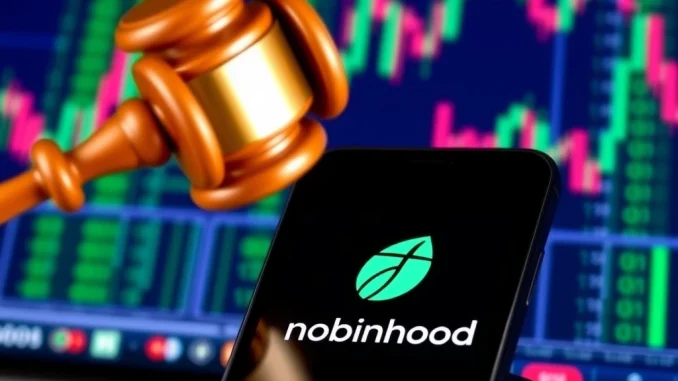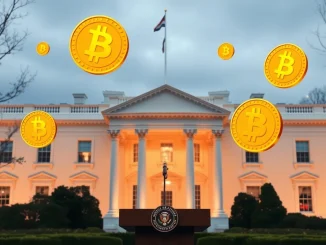
Hold onto your hats, crypto enthusiasts! The world of digital finance is once again buzzing with regulatory activity. This time, it’s Massachusetts setting its sights on Robinhood, the popular trading platform, specifically their brand-new foray into prediction markets. But what’s behind this sudden scrutiny, and what does it mean for you, the everyday crypto investor? Let’s dive deep into this developing story.
Massachusetts Robinhood Probe: A Closer Look at the Investigation
Massachusetts Secretary of State Bill Galvin has officially launched an investigation into Robinhood’s recently unveiled in-app prediction markets hub. This isn’t just a casual inquiry; it’s a full-blown probe, signaled by a subpoena demanding data on Massachusetts users and the marketing materials surrounding these new offerings. The focus? Event contracts linked to major events like March Madness and shifts in interest rates. These contracts are facilitated through Kalshi, a partner firm regulated by the Commodity Futures Trading Commission (CFTC).
Here’s a quick breakdown of what we know so far:
- The Target: Robinhood’s new prediction markets hub.
- The Investigator: Massachusetts Secretary of State Bill Galvin’s office.
- The Trigger: Event contracts tied to March Madness and interest rate outcomes.
- The Partner: Kalshi, a CFTC-regulated platform facilitating the contracts.
- The Demand: Subpoena for user data and marketing materials related to Massachusetts users.
- The Deadline: Robinhood’s response is due by April 3rd.
Why is Massachusetts Zeroing in on Robinhood’s Prediction Markets?
The core question is: Why now? Why Robinhood? And why prediction markets? While the specifics of Galvin’s concerns are still unfolding, we can infer some potential reasons behind this Massachusetts probe.
It likely boils down to investor protection and regulatory oversight in the burgeoning world of crypto-adjacent financial products. Prediction markets, while potentially innovative, can be complex and carry inherent risks, especially for retail investors who may be new to such instruments. Regulators are often keen to ensure that these products are offered responsibly and transparently.
Here are some potential concerns driving the investigation:
- Investor Risk: Are retail investors fully aware of the risks associated with event contracts and prediction markets?
- Marketing Practices: Are Robinhood’s marketing materials accurately and fairly representing these products?
- Regulatory Compliance: While Kalshi is CFTC-regulated, are Robinhood’s offerings fully compliant with all applicable Massachusetts state regulations?
- Accessibility and Suitability: Are these products suitable for the average Robinhood user, or are they too complex and risky for inexperienced investors?
Robinhood’s Stance: Fully Regulated and Retail-Focused
Robinhood, for its part, is maintaining a confident stance. They assert that their prediction market offerings are “fully regulated” and designed to provide event contracts to retail users in a safe and accessible manner. This suggests Robinhood believes they have dotted their ‘i’s and crossed their ‘t’s in terms of regulatory compliance.
However, the crypto regulation landscape is constantly evolving, and interpretations of existing rules can vary. What one entity considers ‘fully regulated’ might still raise eyebrows for another, particularly in the eyes of state regulators like Secretary Galvin.
It’s worth noting that Robinhood has faced regulatory scrutiny in the past. This probe adds to the ongoing narrative of increased attention on crypto platforms and their expansion into new financial territories.
Event Contracts: Understanding the Core of the Issue
At the heart of this investigation are “event contracts.” But what exactly are they? In simple terms, event contracts are a type of derivative that allows users to bet on the outcome of specific events. Think of it like placing a wager, but instead of sports, you’re betting on things like economic indicators, election results, or even weather patterns.
In Robinhood’s case, these initial event contracts are tied to:
- March Madness: Predicting outcomes of games in the NCAA men’s basketball tournament.
- Interest Rate Outcomes: Betting on whether interest rates will rise, fall, or stay the same.
Kalshi, Robinhood’s partner, provides the platform for these contracts. Being CFTC-regulated means Kalshi operates under the oversight of the Commodity Futures Trading Commission, which regulates derivatives markets in the United States.
The Broader Implications for Crypto Prediction Markets and Robinhood
This Robinhood prediction markets probe could have significant implications beyond just Robinhood and Massachusetts. It could set a precedent for how other states approach the regulation of prediction markets, especially those involving cryptocurrencies or related technologies.
For Robinhood, the stakes are high. A negative outcome from this investigation could not only impact their ability to offer prediction markets in Massachusetts but could also create a chilling effect on their expansion into similar innovative financial products in other jurisdictions. It could also raise broader questions about the regulatory landscape for crypto-related offerings on mainstream platforms.
Key Takeaways and Actionable Insights:
- Stay Informed: Keep an eye on developments in this investigation. It could signal broader regulatory trends.
- Understand the Risks: If you’re considering using prediction markets, especially on platforms like Robinhood, ensure you fully understand the risks involved.
- Regulatory Scrutiny is Increasing: This probe is another example of growing regulatory attention on crypto and related financial products. Expect more scrutiny in the future.
- Platform Responsibility: The investigation highlights the responsibility of platforms like Robinhood to ensure they are offering products responsibly and in compliance with regulations.
What’s Next? Waiting for April 3rd and Beyond
All eyes are now on April 3rd, the deadline for Robinhood to respond to the subpoena. Their response will likely be crucial in shaping the direction of this investigation. Depending on the findings, the Massachusetts Secretary of State’s office could take various actions, ranging from requiring additional disclosures and safeguards to potentially restricting or even halting Robinhood’s prediction market offerings in the state.
This crypto regulation story is far from over. It serves as a powerful reminder of the dynamic and often complex interplay between innovation, regulation, and investor protection in the rapidly evolving world of digital finance. Stay tuned for updates as this story unfolds – we’ll be here to break down the developments and what they mean for you.



